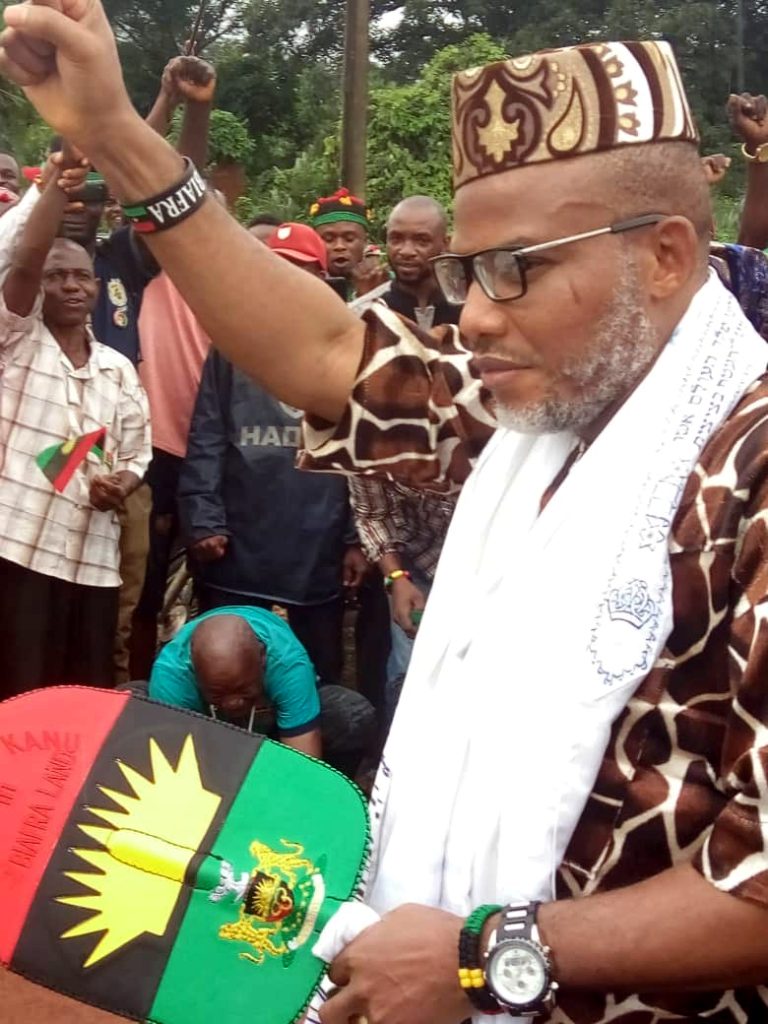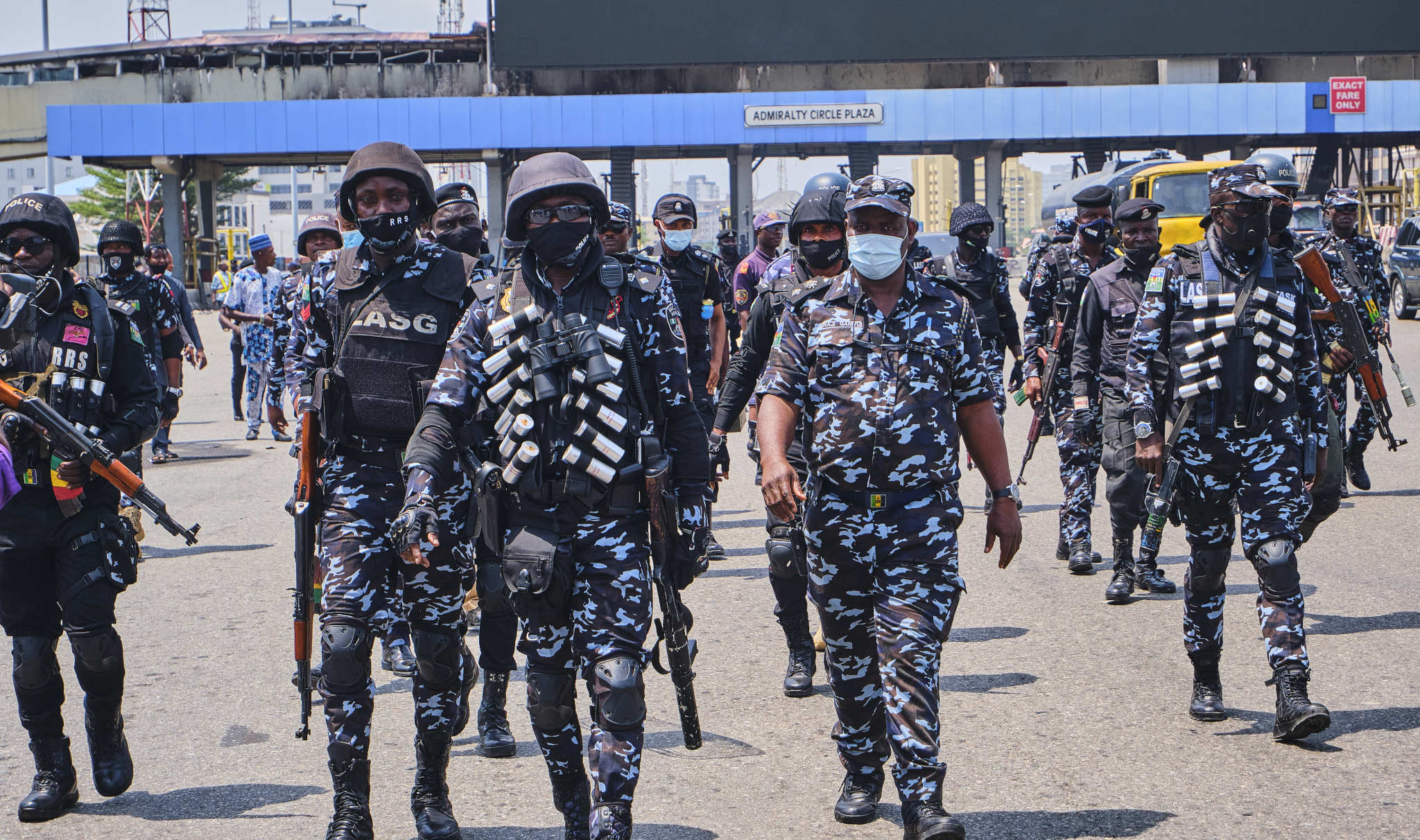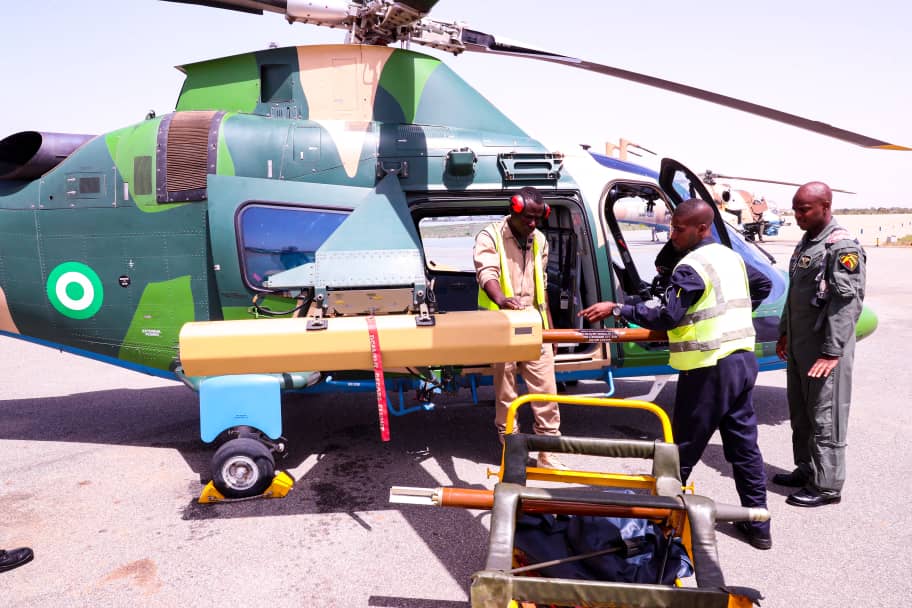British government officials believe there is “chronic corruption” among Nigeria’s security forces and that many of the human rights accusations against them are “true”. But they want UK military assistance to continue as the country represents a “potentially huge market” for arms sales.
That is Whitehall’s view of its key west African counter-terrorism ally, laid bare in a cache of secret UK documents obtained by Declassified. The papers were written last year, just months after Nigerian soldiers massacred 11 protesters in the port city of Lagos in 2020.
They show London was fully aware of the regime’s abusive nature but planned to continue offering “high risk” support to its armed forces, judging that “there would likely be minimal reporting from domestic media” in Britain.
UK diplomats assess that Nigeria’s counter-terrorism campaign has been hollowed out by fraud and low morale.
Ministers were briefed that licences to export arms from the UK should be granted in a faster and more “flexible” fashion. In addition, diplomats were “working hard” to overcome “an inaccurate perception that the UK is not willing to sell [weapons] to Nigeria”.
The calculations were made in the context of Nigeria being the “third biggest supplier of oil to the UK” and having a “long history” of cooperation on counter-terrorism.
War on terror
British troops are stationed in the west African former colony to help battle Boko Haram, a Taliban-type insurgent group notorious for kidnapping school girls. But in an echo of the West’s failure to build an Afghan army, UK diplomats assess that Nigeria’s counter-terrorism campaign has been hollowed out by fraud and low morale.
“The Nigerian Army claim there are 20,000 troops deployed in the North East,” a UK official wrote in reference to Boko Haram’s geographical stronghold. “However, the number is highly likely to be significantly less due to corruption” and desertion, anticipating “thousands of ‘ghost’ soldiers for whom the cash wages and living allowances are withdrawn, but exist only on paper.”
Whitehall worried their ally was actually making matters worse, stating bluntly: “Nigerian police and military suffer from chronic corruption, severe overstretch and under-resourcing, with the typical security force response consistently heavy-handed; increasing distrust, resentment and fueling tensions.”
Despite these concerns over human rights abuses and corruption, the UK offered to lend Nigeria £1.5 billion to buy British weaponry.
Detention sites
Nigeria’s forgotten corner of the ‘war on terror’ has seen thousands of suspects arrested and held by its army and intelligence agencies – often in brutal conditions.
“Across the detentions landscape the UK assesses that conditions and due process fall far below minimum international standards,” British files show, with concern about “cruel, inhumane and degrading treatment in military centres”.
A UK official wrote: “Nigerian Armed Forces have allegedly committed multiple human rights abuses on suspected terrorists and civilians, including in direct conflict settings, detention centres and internally displaced people’s camps, which have deepened grievances towards the state.”
Last year, diplomats were “lobbying and monitoring on 27 (non-disclosed) UK interest detainees”, described as being of “mutual interest” to both countries. It is not clear from the documents if they are British nationals.
Twelve of the prisoners were being held in the capital Abuja at a site where the UK wanted conditions to improve “urgently”, planning to raise it with the Nigerian president’s chief of staff. The site is in the headquarters of the Department of State Services (DSS), a Nigerian intelligence agency, located 500 metres from the parliament building.
A few months after the documents were written, a British citizen, Nnamdi Kanu, was forcibly taken from Kenya to Nigeria and detained by the DSS in Abuja. Kanu leads a separatist group which seeks independence for Biafra in south east Nigeria.

Shirin Marker, a lawyer representing the Kanu family at the London-based solicitors firm, Bindmans LLP, said: “These documents show Britain was already well aware of the awful detention conditions at the DSS headquarters shortly before Mr Kanu was imprisoned there. We’ve raised his case repeatedly with the Foreign Office and they have accepted that aspects of his detention do amount to torture.
“Mr Kanu is held in solitary confinement for 23 hours a day and has restricted access to his Nigerian legal team and appropriate medical treatment. By law, Mr Kanu should be being held at a correctional facility – not the DSS headquarters, which is essentially the intelligence services office of Nigeria.”
The files indicated that “militant activity” by Kanu’s group is increasing and that “polarisation has sharpened” within Nigeria. British officials said privately that the Nigerian government’s response to ethnic conflict “has been poor.”
An official commented: “Bombing forests, the favoured hide-outs of bandits, is costly, displaces communities and heightens grievances; paying off bandits is ineffective and likely to incentivise further acts of criminality; whilst endemic corruption in the military has drained a relatively large budget.”
A spokesperson from the Nigerian High Commission in London told Declassified: “The British Army is working very closely with the Nigerian Army and is physically present in Nigeria and they have never indicated any concern. All the allegations are completely false.”
Reputational risk
The files we have seen were drawn up as briefing notes ahead of a visit by armed forces minister James Heappey to west Africa in March 2021. His trip took place six months after Nigerian troops had opened fire on protesters from the End SARS movement, which campaigned against brutality by the police’s Special Anti-Robbery Squad (SARS).
The shooting triggered a secret review of Whitehall’s Overseas Security and Justice Assistance (OSJA) to Nigeria. Officials wanted a one month freeze on training of Nigeria’s military in the UK – with the exception of nine students already here – while the review was carried out.
The review “determined that continued human rights abuses by the Nigerian Armed Forces have led to some increased risk to reputation to the UK”.
They found that six out of ten OSJA projects in Nigeria were “graded as high risk…meaning there is a serious risk that the assistance might directly or significantly contribute to a violation of human rights, or a serious risk of reputational damage from this activity, and these risks cannot be effectively mitigated.”
Yet British engagement with Nigeria’s military was recommended to continue, albeit with a stronger focus on “reform” and ministerial sign off.
A “priority” for the reviewers was to resume military training by mid-December 2020, less than two months after the massacre in Lagos, “to allow two Nigerian Army officers to attend Sandhurst, and to avoid the reputational damage of a cancellation of their places.”
While the review was taking place, Declassified exposed that Nigerian air force pilots were training at a commercially run helicopter academy in Cornwall. The Ministry of Defence claimed to be unaware the course was taking place.
The files show British officials believed Nigeria’s air force was itself guilty of human rights abuses, including the accidental bombing of a refugee camp in 2017 which killed 115 civilians.
Boots on the ground
As well as training Nigerian units in the UK, British troops are stationed in remote parts of west Africa to advise on counter-terrorism operations. The files say “the UK retains the largest enduring western military footprint in Nigeria and the LCB [Lake Chad Basin]”, a region rife with Boko Haram.
A Liaison Support Team of around a dozen British soldiers was “situated in a high threat area” of north east Nigeria last year where terrorist groups “enjoy freedom of manoeuvre” and there is no “assured method of extraction” in the event of casualties.
The UK was particularly keen to “enhance and further develop” the “tactical, operational and strategic capability” of Nigeria’s special forces, with pre-deployment training of elite units before they enter Boko Haram hot spots.
Declassified has previously revealed the UK military operates a similar scheme in neighbouring Cameroon – a dictatorship– where it coaches the notorious Bataillon d’Intervention Rapide (BIR) and has spent half a million pounds building two secretive training sites.
“Our engagement is not risk free and the shadow of human rights violations is always present.”
In Nigeria, UK officials note: “Our engagement is not risk free and the shadow of human rights violations is always present…Allegations of human rights violations and wide-spread corruption frequently emerge from NGOs and civil society which weighs heavily on HMG [Britain’s] willingness to engage in a meaningful way.”
They add: “Coupled with endemic corruption, poor government investment in critical infrastructure, poor health and human development indicators, and an overall sharp decrease in stability, the outlook is bleak.”
Since British officials wrote the highly-critical documents, UK support for the west African nation has actually deepened. In February, the UK announced a new “security and defence partnership” to advise Nigeria’s police.
More recently, the Nigerian government claims to have won a major battle against Boko Haram, killing five of the group’s leaders and accepting the surrender of thousands more rank and file members.
Britain’s Ministry of Defence was asked to comment.



